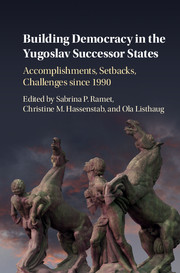 Building Democracy in the Yugoslav Successor States
Building Democracy in the Yugoslav Successor States Book contents
- Frontmatter
- Dedication
- Contents
- List of Boxes
- List of Figures
- List of Tables
- Notes on Editors
- Notes on Contributors
- Preface
- Part I Introduction and Theory
- 1 The Challenge of Democratization: An Introduction
- 2 Post-Yugoslav Patterns of Democratization
- 3 The Importance of Tolerance: Intolerance and Its Consequences in the Yugoslav Successor States
- 4 Institutional Trust in the Yugoslav Successor States: A Comparative Approach
- 5 Political Culture in the Yugoslav Successor States
- 6 The Impact of the ICTY on Democratization in the Yugoslav Successor States
- Part II Country Studies
- Part III Conclusion
- Further Reading
- Index
3 - The Importance of Tolerance: Intolerance and Its Consequences in the Yugoslav Successor States
from Part I - Introduction and Theory
Published online by Cambridge University Press: 25 May 2017
- Frontmatter
- Dedication
- Contents
- List of Boxes
- List of Figures
- List of Tables
- Notes on Editors
- Notes on Contributors
- Preface
- Part I Introduction and Theory
- 1 The Challenge of Democratization: An Introduction
- 2 Post-Yugoslav Patterns of Democratization
- 3 The Importance of Tolerance: Intolerance and Its Consequences in the Yugoslav Successor States
- 4 Institutional Trust in the Yugoslav Successor States: A Comparative Approach
- 5 Political Culture in the Yugoslav Successor States
- 6 The Impact of the ICTY on Democratization in the Yugoslav Successor States
- Part II Country Studies
- Part III Conclusion
- Further Reading
- Index
Summary
Whether one considers the United States or Russia, the Western hemisphere, Eurasia, or the Southern hemisphere, intolerance undermines equality, negates human rights, and puts minorities at risk. Sabrina Ramet identifies three major forms of chauvinism in the Yugoslav successor states: ethnic/national chauvinism, patriarchal chauvinism, and religious chauvinism. Although manifestations of these forms of chauvinism may be symbiotically intertwined, their overall political impact varies. Here, the argument is advanced that the interaction of these forms of chauvinism and accompanying values interact distinctively in certain states, but not others. Thus, ethnic/national chauvinism involves fear of the ethnic “other” combined with hostility toward difference. Also, intolerance is negatively correlated with educational attainment and positively correlated with religiosity, in most cases. Or, to put it more simply, uneducated religious people are likely to be less tolerant of religious diversity and of sexual minorities than are educated non-religious people. Although intolerance is a global phenomenon and thus certainly found across the post-socialist region, in the case of the Yugoslav successor states, the War of Yugoslav Succession (1991–95) and the War for Kosovo (1998–99) did much to traumatize locals and sow resentment while deepening tendencies to intolerance of members of other ethnic and religious groups.
The question of tolerance vs. intolerance in the Yugoslav successor states raises some preliminary questions. To begin with, what do we mean by “tolerance”? Jürgen Habermas neatly distinguishes “tolerance” as a “form of behavior” from “toleration” as “the legal act with which a government grants more or less unrestricted permission to persons to practice their particular religion.” We might extend that definition beyond the juridical sphere to include certain government policies such as socialization themes that promote tolerant attitudes. The association of religious practice and toleration is almost self-evident. To avoid violence, one must tolerate what cannot be compromised. For this reason, Susan Mendus considers skepticism an important reason for justifying toleration. The skeptic affirms tolerance as a basis for liberal democracy and, in particular, an “attitude of neutrality of the state in matters of religion.”
Tolerance is not indifference, however. Joseph Raz identifies tolerance as a “distinctive moral virtue” only if it curbs the tendency to suppress what one considers undesirable.
- Type
- Chapter
- Information
- Building Democracy in the Yugoslav Successor StatesAccomplishments, Setbacks, and Challenges since 1990, pp. 58 - 86Publisher: Cambridge University PressPrint publication year: 2017
